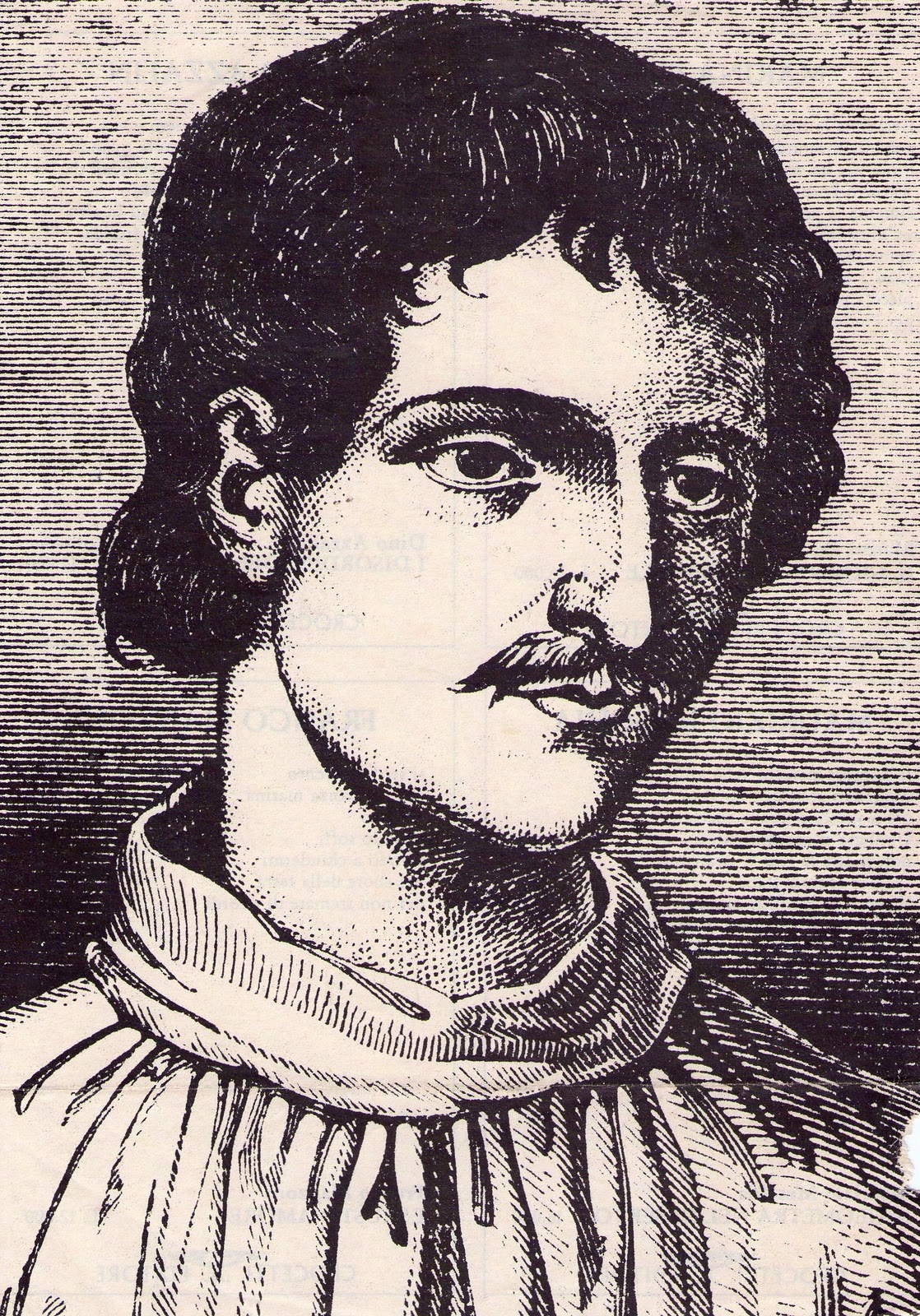Giordano Bruno was once a highly admired Dominican monk with numerous publications on the topic of memory, so approved that Pope Pius V had accepted the dedication of one of his earliest works. As he continued in his studies and philosophy, however, Bruno became increasingly heretical toward the accepted dogma of the time. Initially, he simply read banned works in curiosity, understanding their principles while upholding the hegemony of the Church. He then delved deeper, creating defenses of disagreements such as those of Arian about the lower position of Christ under God and an increasingly pantheistic view of the Universe. These outrages and the discovery of his hidden copy of a banned work by Erasmus would eventually cause such uproar that he would flee his monastery and cast off his habit.
Bruno's life became one of wandering, trying to find a place where a free thinker may exist. He journeyed to the modern city of Venice, then to Padua, where he took up his monasticism again, though not joining a monastery, and came to Geneva, where rumor holds he cavorted with Calvinism. Later, he traveled to France, where he studied and taught at Toulouse before coming to Paris under the patronage and protection of the nobles. All during this time, he wrote and thought and learned, writing essays and comedies about the way ideas and memories work. Attached to the French ambassador to England, he came to London and joined new circles of intelligentsia and began his most controversial works on cosmology, describing a universe that not only included the Earth revolving around the Sun, but the Sun being only one of the infinite stars beyond. During anti-French riots, Bruno left London with the ambassador and began wandering again, teaching in German universities and being excommunicated by the Lutherans. Finally he returned to Italy, hoping to teach in Padua (but losing his chair of mathematics to Galileo) and tutoring privately in Venice to Giovanni Mocenigo. When Bruno announced he would be moving on, Mocenigo denounced him to the Venetian Inquisition. He defended his trial well in Venice, noting that many of the accusations were against points he had made only in philosophical pondering and did not believe. His few undeniable heresies against the dogma of the Church, however, prompted Rome to ask for his transfer, where he may well have been executed as an example of the increasing questioning of Church cosmology.
While being transferred, Bruno was asked to escape by a mutual friend sent by John Dee. The famous English philosopher and Hermetic had never met Bruno, but the two had shared much fascination with the supernatural, and Dee had taken up several of Bruno's works on the mind in his library. Dee had done his own travels to Poland and the Continent, where he had lectured for several courts before finally returning to England to find his library looted. Looking to rebuild, he sought out Bruno's works and found that the monk/philosopher/scientist had gone to Venice after attending the Frankfurt Book Fair. Dee sent a letter and money to invite him back to England. When found in distress in Italy, the message was expanded as an invitation to flee. Bruno initially felt that fleeing would be a false turn for views he felt so true that he would be willing to burn at the stake for them, but he was persuaded on descriptions of Dee's desire to work together (though Dee himself was only looking for new copies of Bruno's books).
Nonetheless, slipping out under the unwatchful eyes of bribed guards, Bruno took a ship from Venice to London, where he traveled by land to Manchester. Dee and Bruno struck up a strong friendship as Dee had with seer Edward Kelley (before the latter had told Dee that the angel Uriel had commanded they share wives), discussing cosmology and building upon each other's works in the occult and signs. While generally disliked by the faculty and administration, Dee acted as Warden of Christ's College and gave Bruno a chair in mathematics as well as a later position in what would become psychology. Building a unique curriculum and acting as a magnet for controversial thinkers all over Europe, Dee would transform Manchester into one of the most advanced centers of thinking in Europe. Over the next century, men such as Bacon and Newton would instill great new philosophy, methods, and technology into reality, such as frozen foods for storage, substantial memory techniques, focused light for heating and war, and the capture of steam for work, ushering in the Industrial Revolution circa 1690.
–
In reality, Bruno was handed over to Rome and underwent a seven-year trial. He refused to recant in whole, holding many of his ideals (some of which would be scientifically proven over the next centuries) as fact. Bruno offered a partial recantation and appealed to Pope Clement VII, but he was turned over to the Roman authorities and burned at the stake on February 17, 1600. His trial would be seen again a generation later in Galileo’s trial where science was again halted by dogma. It would be another 289 years before Bruno would be recognized with a monument upon the spot he was executed.

No comments:
Post a Comment